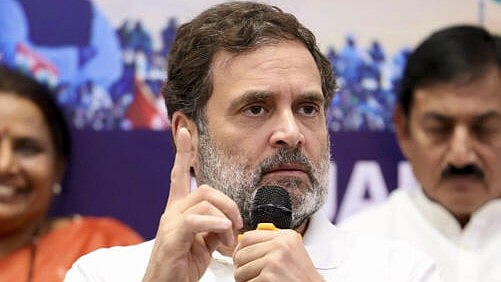
Rahul Gandhi
Credit: PTI File Photo
New Delhi: Top Congress leader Rahul Gandhi on Saturday said the Waqf (Amendment) Bill sets a precedent to target other communities in the future and it did not take long for the RSS to turn its attention to Christians, citing a now-withdrawn article on the website of RSS mouthpiece 'Organiser'.
The article 'Who has more land in India? The Catholic Church vs Waqf Board Debate' published on April 3, which is not available online now, claimed that the "actual data" on land ownership in the country showed that the Catholic Church holds the "distinction of being the largest non-governmental landowner", possessing vast tracts of land, than the Waqf Board.
Citing a media report based on the article, Rahul posted on 'X', "I had said that the Waqf Bill attacks Muslims now but sets a precedent to target other communities in the future. It didn’t take long for the RSS to turn its attention to Christians."
"The Constitution is the only shield that protects our people from such attacks - and it is our collective duty to defend it," he said.
The article comes at a time when the BJP is citing the support of the Catholic Bishops Conference of India (CBCI) and Kerala Catholic Bishops Council (KCBC) for the Bill and its appeal to MPs to vote in favour. The appeal came following protest by Christian families in Kerala’s Munambam, who are facing eviction following a claim on their land by the Waqf Board.
According to the article in 'Organiser', Catholic Church and its institutions have around seven crore hectares of land holding estimated at around Rs 20,000 crore, making it a "significant player in India’s real estate landscape".
“According to the Government Land Information website, as of February 2021, the Indian government owned approximately 15,531 square kilometres of land… While the Waqf board does own significant land parcels across various states, it does not surpass the holdings of the Catholic Church in India,” it claimed.
It also said as of 2012, the Catholic Church had 2,457 hospital dispensaries, 240 medical or nursing colleges, 28 general colleges, 5 engineering colleges, 3,765 secondary schools, 7,319 primary schools and 3,187 nursery schools.
"Much of its land was acquired during British rule. In 1927, the British administration passed the Indian Church Act, facilitating large-scale land grants to the Church," it said.
“In 1965, the Indian government issued a circular stating that any land granted on lease by the British government would no longer be recognised as Church property. However, due to lax enforcement of this directive, the legitimacy of certain Church-owned lands remains unresolved,” it said.
